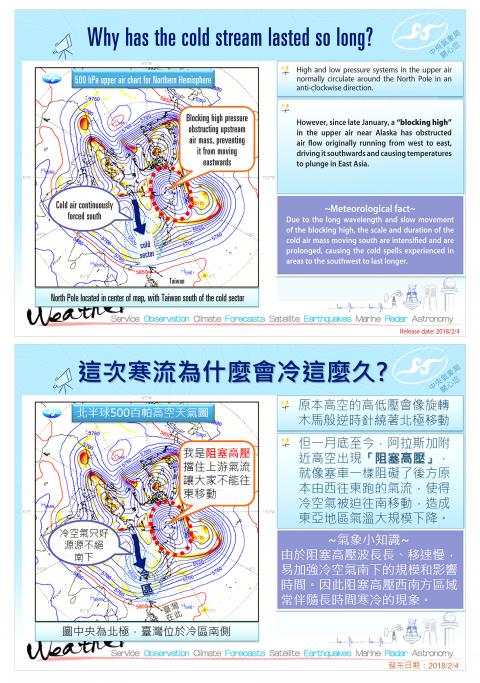Two strong cold masses in succession hit Taiwan last week, and have remained for ten days, with a strong continental cold air mass and cold stream driving temperatures down. According to Central Weather Bureau (CWB) Weather Forecast Center Director Lu Kuo-chen, the reason the cold temperatures have remained for such a prolonged period is primarily due to the persistence of a “blocking high pressure” channeling dense air southward.
The CWB forecast early last month that two cold air masses would hit Taiwan. On the evening of Jan. 28, a northerly front arrived, bringing with it a strong continental cold air mass. On Saturday, this cold air mass intensified and turned into a cold stream. The forecast was that the cold stream would not abate until today, by which point the cold spell would have lasted for 10 days.
During an interview on Saturday, Lu said that the CWB found the cold spell on this occasion was gradual, as opposed to the strongest cold stream in a decade that hit Taiwan two years ago. That cold stream, caused by Arctic oscillation, delivered strong, cold air in a relatively short period of time, and left after a similarly short duration. The long stay of the cold stream on this occasion is due to the blocking high pressure obstructing the air stream.

Photo: Screen grab from Central Weather Bureau’s facebook page
照片:擷取自「報天氣-中央氣象局」臉書粉絲團
Lu said that air flowing from west to east was obstructed by a blocking high formed over the Kamchatka Peninsula, forcing it to be compressed and to flow south, arriving in higher latitude areas such as Japan before moving down to Taiwan. This accounts for the intensity of the cold.
Furthermore, the low-lying and denser nature of the air mass meant that it was able to lift larger volumes of warm air and, with a weather front moving over from southern China progressing in an easterly direction, it affected the north and east parts of Taiwan, bringing snowfall to mountainous areas of altitidues over 1,000m.
(CNA, translated by Lin Lee-kai)
兩波強冷空氣接連影響台灣,時間長達十天,從強烈大陸冷氣團到寒流,一波比一波冷;至於為何冷這麼久,氣象局預報中心主任呂國臣說,這是因為阻塞高壓擋住了氣流,冷空氣變厚、往南竄所致。
中央氣象局一月下旬就預報有兩波冷空氣將襲台,二十八日晚上起鋒面南下後,強烈大陸冷氣團來到台灣,冷氣團強度在上週六增強為寒流。估計本月七日白天起才會漸漸減弱,強冷空氣影響台灣時間前後達十天。
呂國臣週六受訪時說,氣象局分析後發現,這次漸進式的冷,與兩年前霸王級寒流的成因不同──兩年前是北極震盪,快速帶來強冷空氣,影響時間較短;這次時間拉得長,是與氣流受阻有關。
呂國臣說,在堪察加半島有一個阻塞高壓形成,阻擋了由西往東的氣流;因氣流受阻,冷空氣被迫往南移,且愈積愈厚,分批先到日本等緯度較高地區,再流竄到台灣,所以冷空氣才會一波比一波強。
另因冷空氣又深又厚,暖空氣抬升的量更大,且華南雲雨區東移,天氣才會又溼又冷,迎風面的台灣北部、東部更明顯,一千公尺以上的高山都降雪。
(中央社)

In today’s digital age, every click and swipe generates data, and the need for reliable and efficient data management has become critical. This is where data centers come into play. Data centers include servers, storage drives, networking equipment, and other hardware to manage, process, and store vast amounts of digital information. __1__ For that reason, some companies are pursuing an unusual idea: placing data centers under the surface of the ocean. What makes underwater data centers cheaper than traditional land-based ones? For one thing, the cool temperature of the ocean means that companies can cut down on the high cost of

A: Apart from BTS’ J-Hope and EXO’s Xiumin, Hong Kong singer Eason Chan is holding six concerts in Kaohsiung. B: And versatile British musician Jacob Collier is visiting Taiwan for the first time, performing in New Taipei City tonight. A: US singer Lauv and rock band LANY will also stage individual shows in Kaohsiung next week. B: Plus, Singaporean singer JJ Lin will hold two concerts at the Taipei Dome in early June. A: Which show are you going to? A: 除了BTS的J-Hope和EXO的Xiumin,香港歌王陳奕迅正在高雄熱唱6場。 B: 而多才多藝的英國歌手雅各柯里爾首度訪台,今晚即將在新北開唱! A: 美國歌手洛夫、搖滾樂團藍尼下週也分別在高雄演出。 B: 此外新加坡歌王林俊傑則將於6月初,首次挑戰台北大巨蛋嗨唱兩場。 A: 你想去聽誰的演唱會? (By Eddy Chang, Taipei Times/台北時報張迪)

US President Donald Trump on Monday last week signed the TAKE IT DOWN ACT (Tools to Address Known Exploitation by Immobilizing Technological Deepfakes on Websites and Networks Act), bipartisan legislation that enacts stricter penalties for the distribution of non-consensual intimate imagery, sometimes called “revenge porn,” as well as deepfakes created by artificial intelligence. The measure, which goes into effect immediately, was introduced by Sen. Ted Cruz, a Republican from Texas, and Sen. Amy Klobuchar, a Democrat from Minnesota, and later gained the support of First Lady Melania Trump. Critics of the measure, which addresses both real and artificial intelligence-generated imagery, say

1. 我不夠快。 ˇ I wasn’t fast enough. χ I wasn’t enough fast. 註:enough用作副詞時,一般放在它修飾的形容詞或其他副詞後面。例如: The tea is hot enough.(茶是夠熱。) He did not work hard enough.(他不夠用功。) 但enough用作形容詞時,前置或後置都可以。例如: There is enough food (/food enough) for us. 2. 今晚七時我們將開董事會。 ˇ We are having a board meeting at seven o’clock this evening. ˇ We are having a board meeting this evening, at seven o’clock. χ We are having a board meeting this evening at seven o’clock. 註:如果有多個時間副詞,一般單位大的放在單位小的後面。例如: I was born in May 1939. The meeting was held at five o’clock yesterday afternoon. 但如果大的單位是說話者強調的重點,則可以放在前面,但後面要有逗號,表示停頓。例如: He arrived yesterday afternoon, at about five o’clock. 3. 我生於麻州波士頓。 ˇ I was born in Boston, Massachusetts. χ I was born in Massachusetts, Boston. 註:一般而言,地點副詞的位置,範圍大的放在範圍小的後面。例如: Before